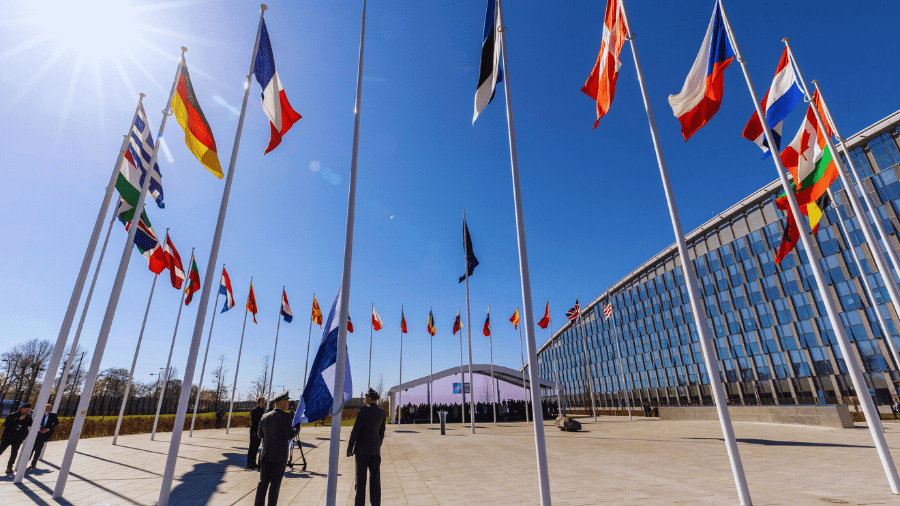This article originally appeared in the Globe and Mail.
By Alexander Dalziel and Henri Vanhanen, April 26, 2023
Finland’s recent accession to NATO, to be followed by Sweden’s in the coming months, marks a milestone. Geopolitically, the entry of these highly educated, well-governed, peaceful countries should prompt Canadians to reconsider strategic security in the Arctic, a region of utmost significance to Canada. But it also holds a lesson for Canadian politicians about leadership in matters of national security, defence and foreign policy.
So far, Russia’s aggression in Ukraine has not sparked meaningful debate in Canada about its Arctic strategy, at least not in the same way that China’s rise has pushed Ottawa to develop an Indo-Pacific strategy. Yet Russia has altered Arctic geopolitics in a way Ottawa must not ignore. NATO’s Nordic enlargement reflects those changes and contains lessons that Canada should draw from. Finland in particular illustrates how Canada might reimagine its role.
First, Canadians need to better factor in hard power and deterrence in the Arctic. Finland, a peaceful country known for its adherence to international law and the ability to field an advanced military that is some 280,000 soldiers strong in wartime, has a strategic equation that mixes military deterrence and an unwavering commitment to dialogue. Canada’s Arctic strategy is shaped by the view that military presence is provocative and destabilizing. A more sophisticated perspective will be required in the years ahead.
Second, having all the Nordic countries in NATO will itself bring strategic change. Alongside Denmark, Iceland and Norway, the arrival of Finland and Sweden will invigorate debate about the Alliance’s “northern flank” and put pressure on Canada to define its posture. The Nordics have already announced a unified air defence to counter the rising threat from Russia. Furthermore, the Nordics have a long history of political co-ordination through bodies like the Nordic Council of Ministers that will transfer into their work in the North Atlantic Alliance.
In the past, uncertainty in Canada about hard power has impeded its ability to shape NATO discussions about the Arctic – even though the region is as much under the articles of the NATO treaty as any other – leaving it at times a hindrance to the organization’s strategizing. Ideally, Canada would find areas of alignment with a Nordic bloc and define a clear NATO Arctic posture. This would boost the prospects of altering big-power behaviour in favour of a rules-based system, influencing U.S. policy and defanging the inevitable Russian and Chinese critiques of NATO’s “militarizing” the Arctic. For Canada, such clarity is essential to remove uncertainty around how NATO would respond in the Arctic during a crisis.
Third, co-operation could extend beyond NATO and defence. Russia’s irresponsible behaviour means Canada and the Nordics must make choices about how to involve non-Arctic states in the region. This positioning should be done in careful co-ordination, and cut across military and civilian domains. Canadian-Finnish engagement would build momentum for such an alignment.
One potential area is the A5 group of coastal Arctic Ocean states: Canada, Denmark, Norway, Russia and the United States. Ottawa might argue for Finland’s (as well as Iceland’s and Sweden’s) full inclusion to counterbalance Russia’s international recklessness. Such a move would show that Ottawa grasps the changing dynamics between democracies and authoritarians in the Arctic.
Fourth, Canadians should reflect on how Finland’s clearly articulated foreign policy and security strategy fostered a transparent debate and gave legitimacy to a bold strategic shift. Its NATO accession was not just a bureaucratic process of leaping ratification hurdles, but the culmination of a considered 30-year process in which national goals were set, rules and dialogue were prioritized, and nuance was managed clearly. It allowed Helsinki to read the international situation, to keep it alert to mounting danger, and identify options to respond.
The foreign-policy debate in Finland has exemplified that the world has changed, and not for the better; that old political commitments of the left and right are inadequate to adjust to it; that strategic reflexes must be reconsidered, reworked, or abandoned; that international relationships can change. These can serve as reference points in Canadian debate.
Canadian politicians should take note. For years, opinion polls showed Finns were cautious about NATO membership, but also showed that if their leaders felt NATO was the best way to protect their country, they would follow. And ultimately, it was centrist conservative President Sauli Niinisto and a progressive social democrat, Sanna Marin (who resigned as prime minister earlier this month) who came together to bring accession to the finish line, demonstrating a master-class in leadership and coalition-building for guiding a citizenry through change.
That elected office is a matter of leading public opinion, and not just conforming to it, is a lesson Canada’s politicians might ponder at length.
Alexander Dalziel is a senior fellow at the Macdonald-Laurier Institute. Henri Vanhanen is a research fellow at the Finnish Institute of International Affairs.





